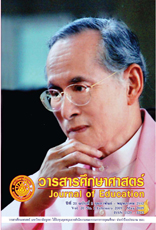การพัฒนาหลักสูตรฝึกอบรมผู้บริหารสถานศึกษา เพื่อเสริมสร้างสมรรถนะการปฏิบัติงานของครูผู้ช่วย สังกัดสำนักงานคณะกรรมการการศึกษาขั้นพื้นฐาน
คำสำคัญ:
การพัฒนาหลักสูตรฝึกอบรม, เสริมสร้างสมรรถนะการปฏิบัติงานของครูผู้ช่วย, หลักสูตรฝึกอบรม ผู้บริหารสถานศึกษา, Developing the training curriculum, Functional Competencies, Training Curriculum for the School Administratorsบทคัดย่อ
การวิจัยครั้งนี้มีวัตถุประสงค์เพื่อพัฒนาหลักสูตรฝึกอบรมผู้บริหารสถานศึกษาเพื่อเสริมสร้างสมรรถนะการปฏิบัติงานของครูผู้ช่วย สังกัดสำนักงานคณะกรรมการการศึกษาขั้นพื้นฐาน โดยดำเนินการวิจัยในรูปแบบของการวิจัยและพัฒนา มี 5 ขั้นตอน ดังนี้
ขั้นตอนที่ 1 การศึกษาข้อมูลพื้นฐาน เป็นการศึกษาเพื่อจัดเตรียมข้อมูลพื้นฐานที่จำเป็น ประกอบด้วยการสัมภาษณ์ผู้บริหารสถานศึกษา การศึกษาเอกสารและงานวิจัยที่เกี่ยวข้อง ผลจากการศึกษาทำให้ทราบปัญหาและความต้องการของผู้บริหารสถานศึกษา แนวคิดการสร้างเสริมสมรรถนะการปฏิบัติงานของครูผู้ช่วย ตลอดจนองค์ประกอบของหลักสูตรฝึกอบรม
ขั้นตอนที่ 2 การพัฒนาหลักสูตรฝึกอบรม เป็นการพัฒนาหลักสูตรฝึกอบรมประกอบด้วย หลักการและเหตุผล แนวคิดพื้นฐานในการพัฒนาหลักสูตรฝึกอบรม วัตถุประสงค์ของหลักสูตรฝึกอบรม เนื้อหาของหลักสูตรฝึกอบรม กิจกรรมและระยะเวลาฝึกอบรม สื่อที่ใช้ในการฝึกอบรม สื่อที่ใช้ในการฝึกอบรม การวัดและประเมินผลการฝึกอบรม สำหรับเนื้อหาของหลักสูตรนี้มี 5 หน่วยการเรียนรู้ ในแต่ละหน่วยการเรียนรู้ประกอบด้วยคำอธิบายหน่วยการเรียนรู้ วัตถุประสงค์การฝึกอบรม เนื้อหาการฝึกอบรม กิจกรรมการฝึกอบรม สื่อการฝึกอบรม การวัดและประเมินผลการฝึกอบรม ซึ่งการพัฒนาหลักสูตรฝึกอบรมครั้งนี้ ได้จัดทำเป็นโครงร่างหลักสูตรฝึกอบรมก่อนแล้วนำไปจัดกลุ่มสนทนาผู้ทรงคุณวุฒิ จำนวน 10 คน จากนั้นได้ปรับปรุงแก้ไขหลักสูตรฝึกอบรมตามข้อเสนอแนะของผู้ทรงคุณวุฒิ เพื่อให้ได้หลักสูตรฝึกอบรมที่สมบูรณ์ก่อนนำไปทดลองใช้จริง
ขั้นตอนที่ 3 การตรวจสอบประสิทธิภาพของหลักสูตรฝึกอบรม เป็นการนำหลักสูตรฝึกอบรมที่ปรับปรุงแล้วไปทดลองใช้กับกลุ่มตัวอย่าง ซึ่งเป็นผู้บริหารสถานศึกษาที่ได้รับการบรรจุและแต่งตั้งครูผู้ช่วย จำนวน 30 คนรูปแบบการทดลองเป็นแบบกลุ่มเดียวทดสอบ 2 ครั้ง มีการทดสองก่อนและหลังการทดลองด้วยแบบทดสอบ หลังการทดลองมีการประเมินการใช้หลักสูตรฝึกอบรม ผลการทดลองพบว่าผู้เข้ารับการฝึกอบรมมีความรู้ ความเข้าใจหลังการทดลองมากกว่าก่อนการทดลองอย่างมีนัยสำคัญทางสถิติที่ระดับ .05 นอกจากนี้ยังพบว่าผู้เข้ารับการฝึกอบรมสามารถผ่านวัตถุประสงค์ทุกหน่วยการเรียนรู้คิดเป็นร้อยละ 80 ตลอดจนสามารถนำความรู้ที่ได้รับการฝึกอบรมไปกำหนดแนวทางการปฏิบัติงานเพื่อเสริมสร้างสมรรถนะการปฏิบัติงานของครูผู้ช่วย คิดเป็นร้อยละ 85 ขึ้นไป
ขั้นตอนที่ 4 การติดตามผลการฝึกอบรม เป็นการติดตามผลการฝึกอบรมหลังจากฝึกอบรมผู้บริหารสถานศึกษาผ่านไปแล้ว 2 เดือน เพื่อทราบผลการปฏิบัติในการเสริมสร้างสมรรถนะการปฏิบัติงานของครูผู้ช่วย พบว่า สมรรถนะการปฏิบัติงานของครูผู้ช่วย มีค่าเฉลี่ยการปฏิบัติระหว่าง 4.06 – 4.93 ซึ่งอยู่ในระดับมากถึงมากที่สุดทุกรายการประเมิน
ขั้นตอนที่ 5 การปรับปรุงหลักสูตรฝึกอบรม เป็นการนำเสนอข้อมูลที่ได้จากการฝึกอบรมมาปรับปรุงแก้ไขหลักสูตรฝึกอบรมให้มีความสมบูรณ์ ทุกองค์ประกอบของหลักสูตรฝึกอบรม แล้วเรียบเรียงเป็นหลักสูตรฝึกอบรมที่มีประสิทธิภาพตามวัตถุประสงค์การวิจัย
Abstract
The purpose of this research was to develop the training curriculum for the school administrator to enable the functional competencies of the assistant teacher under the office of the Basic Education. There were 5 following process of the research and development.
Stage 1 : Study the basic data. It was to prepare the necessary basic data consisted of school administrator interviewing , study document and the concerned research, and setting the focus group the study results were the problem and the school administrator’s requirements, the line of thought on the functional competencies of teacher assistant and the constituents of the training curriculum.
Stage 2 : Building the training curriculum. This stage was to build the training curriculum consisted of principles and reason, the line of thought on the training curriculum development, the objectives of the training curriculum, the subjects of the training curriculum, the activity, the duration of training, the media used for training, and the methods of training assessment. This curriculum was derided into 5 learning units, each consisted of learning unit explanation, training requirement, subject of the training activity, training media, measuring and the training assessment.
Stage 3 : Examining the Functional Efficiency of the Training curriculum. It was to trail the improved training curriculum with the sample group that was post appointed school administrators and approved training curriculum with the sample group that was post appointed school administrators and appointed Teacher assistant for 30 cases. The experiment from One-Group Pretest Posttest Design, pre and post experiment with the test form. During the experiment, there was the assessment made through the training curriculum requirement of each learning unit by test form used. The performance and behavior assessment form of the trained persons. There was an assessment post experiment of the training curriculum usage. Form the experiment result found that the trained persons have the knowledge, more understood post experiment result found that the trained persons have the knowledge, more understood post experiment with the statistically significant level at .05. It was also found that the trained persons passed every learning unit requirement accounted 80% and able to bring the trained knowledge to define the performance tendency for enable the functional competencies of the Teacher assist accounted 85% and over.
Stage 4 : Following up the training result it was the school administrator post training following up to 2 months passed by, it was to find out the functional competencies of the Teachers assistant. The following up result found that the school administrators were enable the functional competencies of the Teacher assistant with the practical means ranged between 4.06-4.93 which was in a much level to the most at every assessed particular.
Stage 5 : Improving the Training curriculum. Ii was the data collected from the training to adjust and improve the training curriculum to the completeness on every constituent of the training curriculum. The result of the performance cause the training curriculum effectiveness to meet the research requirement.
ดาวน์โหลด
เผยแพร่แล้ว
รูปแบบการอ้างอิง
ฉบับ
ประเภทบทความ
สัญญาอนุญาต
ลิขสิทธิ์ของบทความที่ปรากฏในวารสารศึกษาศาสตร์ มหาวิทยาลัยบูรพา เป็นของวารสารศึกษาศาสตร์ มหาวิทยาลัยบูรพา ทั้งนี้บทความทุกเรื่องผ่านการตรวจสอบความถูกต้องทางวิชาการจากผู้ทรงคุณวุฒิ ข้อความและข้อมูลของบทความในวารสารฯ เป็นแนวคิดของผู้แต่ง มิใช่เป็นความคิดเห็นของกองบรรณาธิการ และมิใช่ความรับผิดชอบของคณะศึกษาศาสตร์ มหาวิทยาลัยบูรพา ไม่สงวนลิขสิทธิ์การนำไปใช้ประโยชน์ทางวิชาการแต่ต้องอ้างอิงแสดงแหล่งที่มาและอยู่ในขอบเขตของกฎหมายลิขสิทธิ์



